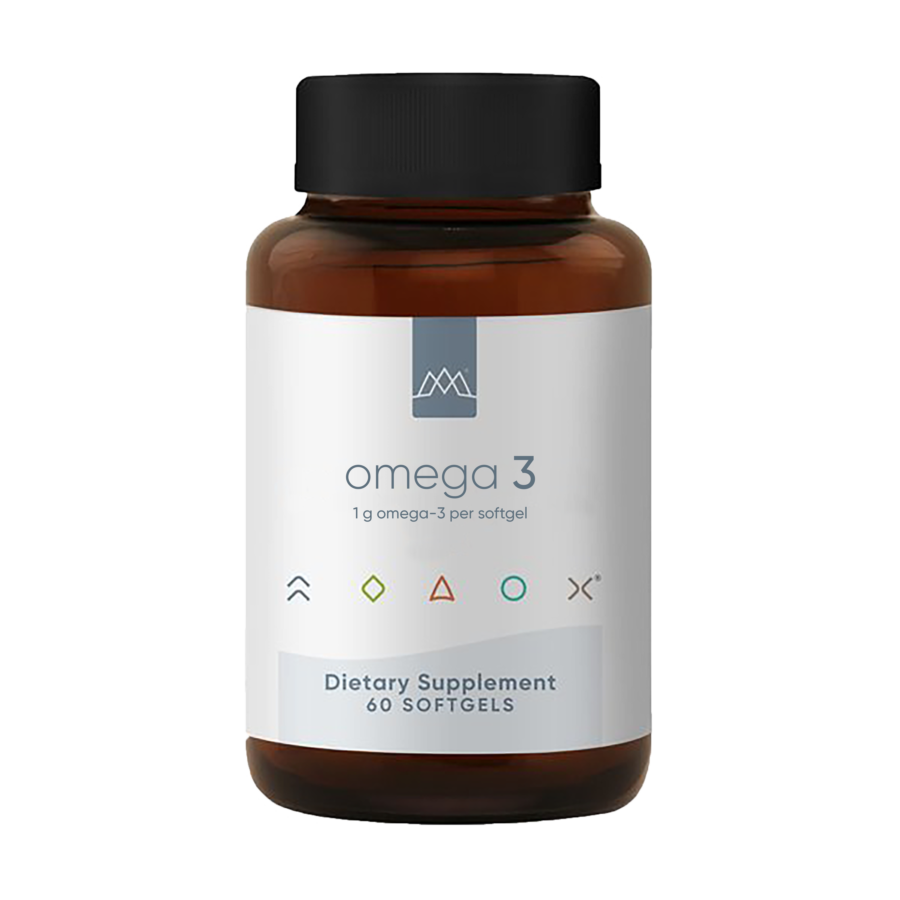Omega-3 Fatty Acids are a special type of fat that is essential for your health. These aren’t the kinds of fat you find in fried foods or butter, though. The three main omega-3 fatty acids are alpha-linolenic acid (ALA), eicosapentaenoic acid (EPA), and docosahexaenoic acid (DHA). ALA is found mainly in plant oils such as flaxseed, soybean, and canola oils, while DHA and EPA are found in fish and other seafood.
 Most Americans have little issue reaching their recommended ALA levels each day, while few consume enough DHA and EPA. This is a major issue for your body because DHA and EPA are what are known as essential nutrients. This means your body cannot produce DHA and EPA itself using smaller building blocks but instead needs to pull them directly from what you consume.
Most Americans have little issue reaching their recommended ALA levels each day, while few consume enough DHA and EPA. This is a major issue for your body because DHA and EPA are what are known as essential nutrients. This means your body cannot produce DHA and EPA itself using smaller building blocks but instead needs to pull them directly from what you consume.
Why is it so important to consume these little fatty acids? Because Omega-3 Fatty Acids have a unique chemical make-up that allows them to play a special role in helping to surround your cells as part of the cell membrane. Having a strong and smart cell membrane is very important for the health of you and your cells. Healthy cell membranes in your retina (part of your eye), brain, and sperm cells contain high levels of DHA, which helps them to do their jobs effectively.
The Benefits of Omega-3 Fatty Acids
Omega-3 fatty acids are also beneficial to your heart, lungs, and blood vessels. How can they help your heart health? It is thought that they help keep your heart healthy by helping to lower triglyceride levels in the blood, a type of bad fat. It’s important to keep your triglyceride levels low because high levels of these bad fats are known to be connected to heart attack, stroke, and heart disease.
Omega-3 fatty acids are also known to help reduce the buildup of harmful plaque in the blood vessels, which can lead to a heart attack or stroke if left unchecked. Other benefits of ensuring that you get a good number of Omega-3 fatty acids include slightly lowering blood pressure, which helps reduce strain on your heart, lungs, and other organs, and decreasing the occurrence of irregular heartbeat, an important part of having a healthy heart.
Recommended Daily Value
 While it’s easy to say that it’s important to consume Omega-3 fatty acids, it’s harder to actually ensure you get enough each day. Part of the reason for this is that there are no established recommended daily allowances for DHA and EPA, despite how important they are for your health. This makes ensuring you are getting enough very important, but difficult, as there are different opinions about how much you need each day, although most recommend a minimum of 250–500 mg combined EPA and DHA each day.
While it’s easy to say that it’s important to consume Omega-3 fatty acids, it’s harder to actually ensure you get enough each day. Part of the reason for this is that there are no established recommended daily allowances for DHA and EPA, despite how important they are for your health. This makes ensuring you are getting enough very important, but difficult, as there are different opinions about how much you need each day, although most recommend a minimum of 250–500 mg combined EPA and DHA each day.
Supplementing Omega-3’s
For most people, this level of intake is achieved only through supplementation. To ensure you are getting enough Omega-3 fatty acids in your diet, your doctor may order a test known as the Omega-3 Index. This test measures the levels of DHA and EPA in your body by checking the levels of them in the membranes of your red blood cells. A good level is at least 8% Omega-3’s, while 4%-8% is intermediate, while anything below 4% is low. Most Americans measure in below 4%, which is far below where you want to be.
The Effects of Low-Level Omega-3 Fatty Acids
What are the possible health effects of being below 4%? A new study suggests that not having enough Omega-3 fatty acids is as predictive of early death as smoking! The Framingham Heart Study was an important research study that followed individuals for a period of years and recorded how certain demographics, health conditions, or lifestyle choices affected length of life. By looking at these factors and associated health data, the Framingham Heart Study was able to establish eight risk factors for cardiovascular (heart) disease, including sex, age, smoking, high blood pressure treatment (versus uncontrolled), diabetes, high blood pressure, low total cholesterol, and high HDL cholesterol.
These eight factors are the ones that doctors typically use to determine your risk of developing or dying from heart disease, as they have been shown in the Framingham Heart Study, and many studies since, to be good predictors of the risk of dying from heart disease. A new study has shown that having an Omega-3 index below 4% can be as predictive of early death as smoking was in the Framingham Heart Study!
This is incredible news, as it was known previously that Omega-3 fatty acids were important for helping you stay healthy, but this data, which studied a group in their mid-sixties for a period of 11 years, showed that having a low Omega-3 index could lead to an early death just as much as smoking. This means having low Omega-3 fatty acids might be as bad for your health as smoking!
How can you make sure your Omega-3 index is high enough?
 You can start with diet by trying to incorporate more omega-3-rich foods into your weekly diet routine. These can include fish like mackerel, salmon, herring, oysters, sardines, anchovies, and even caviar. If fish aren’t up your alley, flax seeds, chia seeds, and walnuts also contain great omega-3 fatty acids, too. You may want to consider supplementation if you don’t find these foods as a regular part of your diet because remember, omega-3 fatty acids like DHA and EPA can’t be made in high enough levels by the body and must be consumed.
You can start with diet by trying to incorporate more omega-3-rich foods into your weekly diet routine. These can include fish like mackerel, salmon, herring, oysters, sardines, anchovies, and even caviar. If fish aren’t up your alley, flax seeds, chia seeds, and walnuts also contain great omega-3 fatty acids, too. You may want to consider supplementation if you don’t find these foods as a regular part of your diet because remember, omega-3 fatty acids like DHA and EPA can’t be made in high enough levels by the body and must be consumed.
MaxLiving has a supplement that has all of the Omega-3 fatty acids you need from your diet and even vitamin E, a powerful antioxidant. Max Omega 3 contains the levels of EPA and DHA your body needs to maintain a healthy Omega-3 index and is even screened for toxic heavy metals to ensure that it contains no harmful mercury, often found in fish. Talk to your doctor about incorporating Max Omega 3 by MaxLiving into your daily routine today.
About the Author

Jini Cicero is a Los Angeles-based Strength and Conditioning Specialist with a bachelor’s degree in Kinesiology. With over 20 years experience as a health, fitness, and nutraceutical professional, Jini is passionate about advancing natural medicine and optimal health. Whether she’s working with Hollywood celebrities or cancer patients, Jini uniquely combines exercise science, sports nutrition, and corrective exercise. As a speaker, presenter, and writer, her work has been featured in numerous publications, such as Shape, MindBodyGreen, and The L.A. Daily News.




